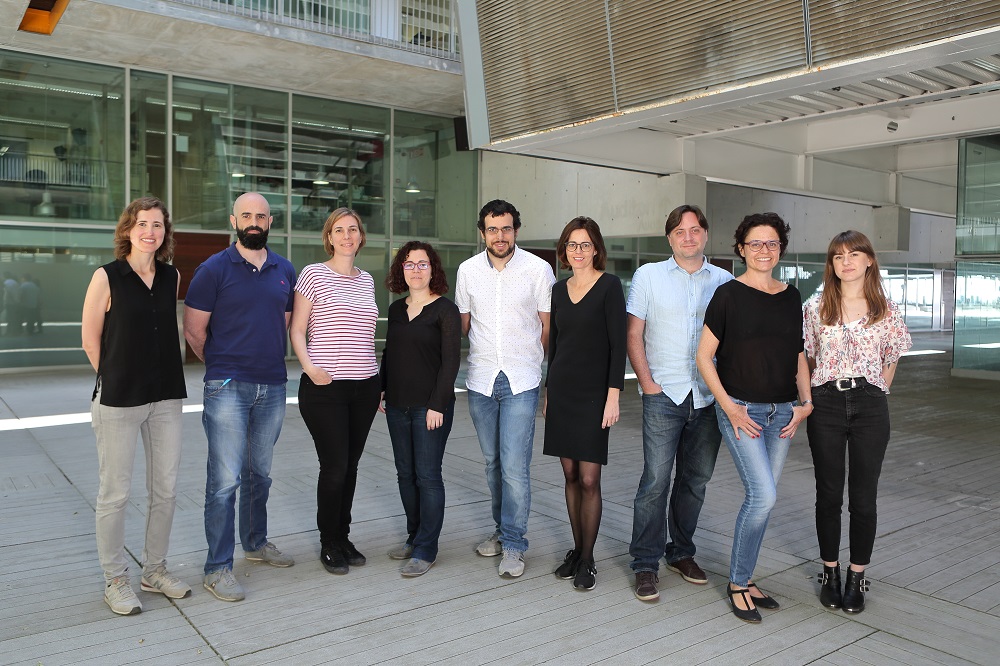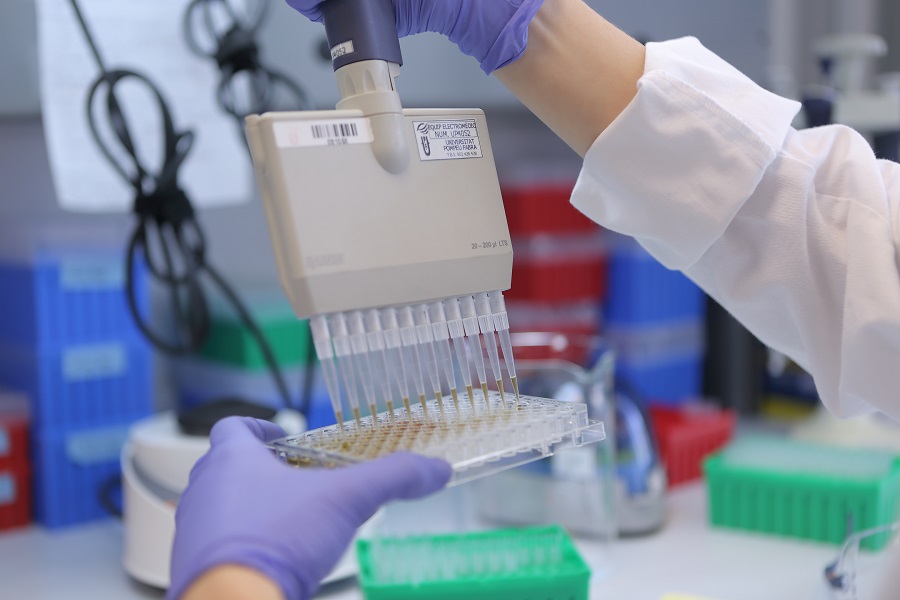CRG/UPF Proteomics unit
Eduard Sabidó

Website
Research Outline
The Proteomics Unit is a joint effort of the Universitat Pompeu Fabra and the Center of Genomic Regulation to create an innovative research infrastructure with a high level of excellence and sustainability to support scientists in the biomedical field. The activities of the Proteomics Unit are focused on the provision of high-quality proteomics services with strong added-value to the research community by i) offering state-of-the-art methods, advise and expertise to support basic and translational researchers; ii) developing new methods and techniques that keep the unit up to date and at the forefront of the proteomics field; and iii) training the community and actively disseminating proteomics science and methods.
The Proteomics Unit is part of the Spanish National Infrastructure for Omics Technologies (ICTS OmicsTech) and the European Proteomics Infrastructure Consortium (EPIC-XS, GA 823839), and it coordinates the European innovative and interdisciplinary Research and Training network PROTrEIN (GA 956148). The Proteomics Unit is also part of the "Plataforma de Recursos Biomoleculares y Bioinformáticos - ProteoRed" of the Instituto de Salud Carlos III, part of the Spanish National Health System (PT17/0019 ).
Services
Quantitative Targeted Proteomics
During the last decade, targeted proteomics has become the method of choice for biomarker validation in human biopsies due to its capacity to measure a set of peptides in multiple samples with high sensitivity, reproducibility, accuracy and precision (Borràs et al., 2016). In the context of quantitative targeted proteomics, our group has evaluated the influence of the digestion technique, protease, and missed cleavage peptides in protein quantitation (Chiva et al., 2014) and we have studied how to select peptides that correctly represent the behaviour of the protein abundance in different conditions (Chiva and Sabidó, 2017). Moreover, our group has recently developed the Isotopologue multiple-point Calibration (ImCal) quantification strategy, which uses a mix of isotopologue peptides to generate internal multiple-point calibration curves for each individual sample (Chiva et al., 2019). ImCal enables the accurate quantification of biomarker peptides in clinical applications without the need for expert supervision.
 Quality control in proteomics experiments
Quality control in proteomics experiments
Our group has worked on the improvement of quality control in proteomics experiments. In this regard we have developed QCloud, a cloud-based system to support proteomics laboratories in daily quality assessment using a user-friendly interface, easy setup, automated data processing and archiving, and unbiased instrument evaluation. QCloud supports the most common targeted and untargeted proteomics workflows, it accepts data formats from different vendors and it enables the annotation of acquired data and reporting incidences. Qcloud was complemented by the development of algorithms for statistical analysis of QC parameters (Dogu et al. 2019).
New methods in quantitative proteomics
In our efforts to improve protein quantification, our group developed a new data-independent acquisition (DIA) method (PCT/IB2019/000549, Borràs and Sabidó, 2018). DIA+ is a novel DIA multiplexing scheme that combines signals from identical peptides with different charge states to improve sensitivity and selectivity while covering a wide m/z range. DIA+ increases the number of peptides identified and quantified when compared to other reference methods, with a ca. 30 % gain.
Team during 2019-20
- PhD students: Melissa Bradbury
- Postdocs: Julia Morales Sanfrutos
- Technicians: Cristina Chiva, Eva Borràs, Guadalupe Espadas, Amanda Solé, Olga Pastor, Roger Olivella, Marc Serret
Selected publications
- Choi M, Carver J, Chiva C, Tzouros M, Huang T, Tsai TH, Pullman B, Bernhardt OM, Hüttenhain R, Teo GC, Perez-Riverol Y, Muntel J, Müller M, Goetze S, Pavlou M, Verschueren E, Wollscheid B, Nesvizhskii AI, Reiter L, Dunkley T, Sabidó E, Bandeira N, Vitek O. MassIVE.quant: a community resource of quantitative mass spectrometry-based proteomics datasets (2020) Nat Methods 17(10):981-984. doi: 10.1038/s41592-020-0955-0.
- Simonet NG, Thackray JK, Vazquez BN, Ianni A, Espinosa-Alcantud M, Morales-Sanfrutos J, Hurtado-Bagès S, Sabidó E, Buschbeck M, Tischfield J, De La Torre C, Esteller M, Braun T, Olivella M, Serrano L, Vaquero A. SirT7 auto-ADP-ribosylation regulates glucose starvation response through mH2A1 (2020) Sci Adv 6(30):eaaz2590. doi: 10.1126/sciadv.aaz2590.
- Welker F, Ramos-Madrigal J, Gutenbrunner P, Mackie M, Tiwary S, Rakownikow Jersie-Christensen R, Chiva C, Dickinson MR, Kuhlwilm M, de Manuel M, Gelabert P, Martinón-Torres M, Margvelashvili A, Arsuaga JL, Carbonell E, Marques-Bonet T, Penkman K, Sabidó E, Cox J, Olsen JV, Lordkipanidze D, Racimo F, Lalueza-Fox C, Bermúdez de Castro JM, Willerslev E, Cappellini E. The dental proteome of Homo antecessor. Nature. 2020 Apr;580(7802):235-238. Doi: 10.1038/s41586-020-2153-8.
- Chiva C, Pastor O, Trilla-Fuertes L, Gámez-Pozo A, Fresno Vara JÁ, Sabidó E. Isotopologue Multipoint Calibration for Proteomics Biomarker Quantification in Clinical Practice. Anal Chem. 2019 Apr 16;91(8):4934-4938. doi: 10.1021/acs.analchem.8b05802.
- Aranda S, Alcaine-Colet A, Blanco E, Borràs E, Caillot C, Sabidó E, Di Croce L. Chromatin capture links the metabolic enzyme AHCY to stem cell proliferation. Sci Adv. 2019 Mar 6;5(3):eaav2448. doi: 10.1126/sciadv.aav2448.
Other relevant information
Organization of the CRG Annual Proteomics Symposium 2019, Nov 2019.
Organization of the EMBO Practical Course on Targeted Proteomics, Nov 2019.
Patent: Improvements in Mass Spectrometry. Filed on 31 May 2019. This International patent application has been allocated the application number PCT/IB2019/000549 and claims priority from EP Patent Application No. 18382384.8, which was filed on 1 June 2018.
